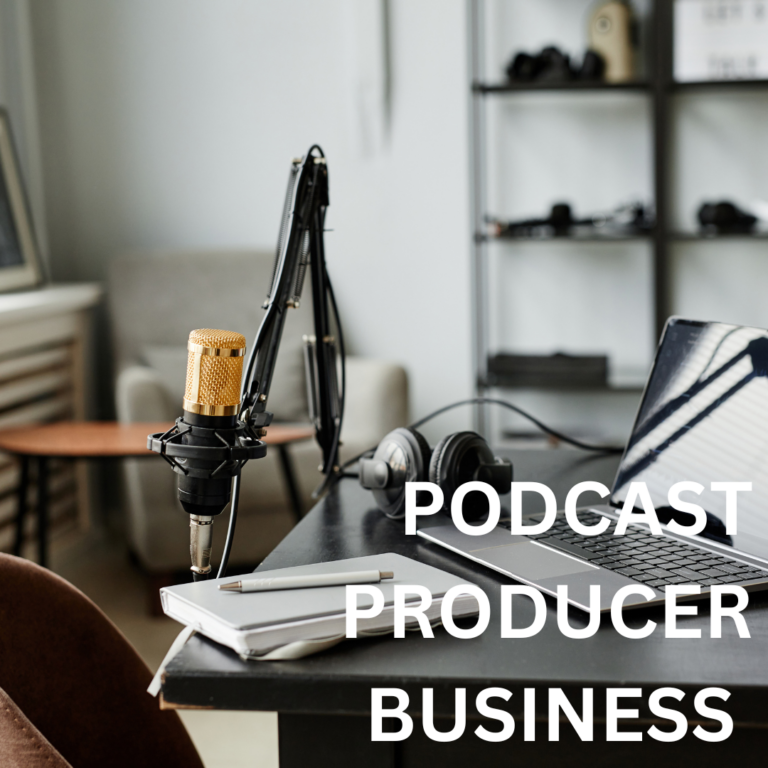Podcasts are more popular than ever, with millions of episodes available across a variety of genres. As the demand for high-quality podcast content grows, so does the need for skilled professionals who can assist in the production process. Starting a podcast producer business is a lucrative opportunity to help others create, edit, and publish their podcasts while turning your expertise into a profitable venture. This article explores the steps to get started, essential tools, earning potential, and tips for success.
Why Start a Podcast Producer Business?
1. Rising Popularity of Podcasts
According to recent statistics, over 460 million people globally listen to podcasts, and this number is expected to grow. Businesses, influencers, and hobbyists are tapping into this medium to reach their audiences.
2. Growing Market Demand
Many individuals and organizations want to launch a podcast but lack the technical skills or time to produce it professionally. This is where podcast producers come in, offering services like recording, editing, and publishing.
3. Flexible Business Model
Podcast production can be done remotely or in person, offering flexibility for producers to work from home or establish a studio.
Services Offered by a Podcast Producer
1. Pre-Production Services
- Concept Development: Help clients brainstorm topics, formats, and episode structures.
- Scriptwriting: Assist with drafting scripts or outlines to ensure smooth recordings.
- Guest Coordination: Schedule and prepare guests for interviews.
2. Recording Assistance
- Set up and optimize recording equipment.
- Provide a professional studio environment or guide clients on home recording setups.
- Monitor live recordings to ensure audio quality.
3. Editing and Post-Production
- Audio Editing: Remove background noise, correct mistakes, and enhance sound quality.
- Adding Effects: Incorporate intros, outros, music, and sound effects.
- Mixing and Mastering: Balance levels for a polished, professional sound.
4. Publishing and Distribution
- Upload episodes to platforms like Spotify, Apple Podcasts, and Google Podcasts.
- Optimize metadata, titles, and descriptions for SEO.
5. Marketing Support
- Create promotional assets such as audiograms, episode highlights, and social media graphics.
- Advise on podcast launch strategies and audience growth.
Tools and Equipment Needed
Essential Equipment:
- Microphones:
- Dynamic mics like the Shure SM7B for studio recording.
- USB mics like the Blue Yeti for remote clients.
- Audio Interface:
- Devices like Focusrite Scarlett for connecting mics to computers.
- Headphones:
- Closed-back models like Audio-Technica ATH-M50x for accurate monitoring.
- Pop Filters and Boom Arms:
- Reduce plosive sounds and ensure optimal mic placement.
- Acoustic Treatment:
- Foam panels or portable vocal booths to improve sound quality.
Software Tools:
- Digital Audio Workstation (DAW):
- Audacity (free) or Adobe Audition for editing and mastering.
- Podcast Hosting Platforms:
- Buzzsprout, Podbean, or Anchor for distributing episodes.
- Graphic Design Tools:
- Canva or Adobe Photoshop for cover art and promotional materials.
- Transcription Services:
- Tools like Descript or Otter.ai to create episode transcripts.
Steps to Start a Podcast Producer Business
1. Learn the Skills
- Take online courses or watch tutorials on audio editing, recording techniques, and podcast marketing.
- Practice by producing your own podcast or volunteering to help friends.
2. Define Your Services
- Decide whether to offer full-service production or specific elements like editing or marketing.
- Create packages tailored to different client needs.
3. Build a Portfolio
- Showcase your skills by producing sample episodes or collaborating on existing podcasts.
- Include before-and-after audio samples to highlight your editing capabilities.
4. Set Up Your Workspace
- Invest in professional equipment for in-person recordings.
- Ensure a quiet, acoustically treated space for editing and monitoring.
5. Market Your Business
- Launch a professional website with service descriptions, pricing, and testimonials.
- Promote your services on social media platforms like LinkedIn, Instagram, and Facebook.
6. Network and Collaborate
- Join podcasting forums or attend industry events to connect with potential clients.
- Collaborate with related professionals, such as voice actors or graphic designers.
Earning Potential for Podcast Producers
Pricing Models:
- Hourly Rate:
- Charge $25 to $100 per hour, depending on experience and services offered.
- Per Episode:
- $100 to $500 per episode for full production (recording, editing, and publishing).
- Monthly Retainer:
- Offer ongoing support for $500 to $2,000 per month, depending on the client’s needs.
Revenue Example:
- Monthly Clients: 5 clients at $1,000 each.
- Total Monthly Revenue: $5,000.
- Annual Revenue: $60,000 (with room for scaling).
Where to Find Clients
- Freelance Platforms:
- Upwork, Fiverr, and Freelancer.
- Create detailed profiles showcasing your expertise.
- Podcasting Communities:
- Join Facebook groups, Reddit threads, or forums like Podcasters’ Paradise.
- Local Businesses:
- Approach small businesses or nonprofits looking to launch podcasts.
- Social Media:
- Share tips, success stories, and client testimonials on LinkedIn and Instagram.
- Networking Events:
- Attend podcast conferences like Podcast Movement or local meetups.
Marketing Strategies for Success
- Optimize Your Website:
- Use SEO strategies with keywords like “podcast editing services” or “affordable podcast production.”
- Include a blog with tips on starting a podcast to attract potential clients.
- Offer Free Resources:
- Create downloadable guides or checklists to capture leads.
- Run Promotions:
- Offer discounts for first-time clients or package deals.
- Leverage Testimonials:
- Showcase reviews from satisfied clients to build trust.
- Engage in Content Marketing:
- Publish articles, videos, or podcasts about podcast production to establish authority.
Challenges and How to Overcome Them
1. Managing Client Expectations
- Clearly communicate timelines and deliverables.
- Use contracts to outline responsibilities and revisions.
2. Balancing Multiple Projects
- Use project management tools like Trello or Asana to stay organized.
3. Staying Updated on Trends
- Continuously learn about new tools, formats, and industry standards.
Tips for Long-Term Success
- Invest in Quality:
- High-quality production builds a strong reputation and attracts premium clients.
- Build Relationships:
- Foster long-term partnerships by exceeding client expectations.
- Expand Your Services:
- Add transcription, marketing, or video podcast production to your offerings.
- Focus on Branding:
- Develop a strong, recognizable brand that resonates with your target audience.
Conclusion
Starting a podcast producer business is a rewarding way to combine technical skills with creativity. By offering valuable services like editing, recording, and publishing, you can help clients bring their ideas to life while building a profitable venture. With the podcasting industry showing no signs of slowing down, now is the perfect time to establish yourself in this growing field. Take the first step today and turn your passion for podcasts into a thriving business.



